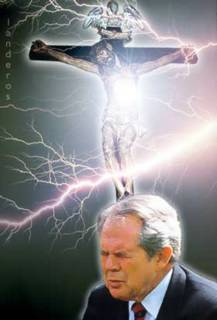You may notice that in my recent posts I have been somewhat critical of official responses to Katrina.
At the same time, I can not say that I am in agreement with
those statements made by rapper Kanye West this weekend. However, having watched the telecast, I can tell you that he is no Pat Robertson; his unscripted words were spoken with the anguished heart of one who has just witnessed unspeakable tragedy and has not necessarily fully processed his emotional response.
Regardless, there is most definitely a racial tinge to this horrible event. In
a recent post, Tom Tomorrow collects evidence of a widespread understanding of this inevitable fact.
Personally, I believe that class played a larger role than race in determining the relative efficiency or inefficiency of the official responses. In the end though, this just reinforces the fundamental question of why so many African Americans fall into the category of those living below the poverty line.
Finally, over at the Newshous w/Jim Lehrer on Friday, Tom Oliphant and Clarence Page replaced Mark Shields in the weekly Shields-Brooks match-up. Predictably,
the conversation was primarily focused on the aftermath of Katrina. Both David Brooks (my sometimes-favorite conservative on television) and Tom Oliphant brought up very important points about some of the thusfar unrecognized consequences of Katrina.
DAVID BROOKS: This is -- first of all it is a national humiliation to see bodies floating in a river for five days in a major American city. But second, you have to remember, this was really a de-legitimization of institutions.
Our institutions completely failed us and it is not as if it is the first in the past three years -- this follows Abu Ghraib, the failure of planning in Iraq, the intelligence failures, the corporate scandals, the media scandals.
We have had over the past four or five years a whole series of scandals that soured the public mood. You've seen a rise in feeling the country is headed in the wrong direction.
And I think this is the biggest one and the bursting one, and I must say personally it is the one that really says hey, it feels like the 70s now where you really have a loss of faith in institutions. Let's get out of this mess. And I really think this is so important as a cultural moment, like the blackouts of 1977, just people are sick of it.
TOM OLIPHANT: And we're still feeling it. I mean there are at least three more shocks yet to come on top of everything that has happened to this hour. One, sadly, is going to be the body count which we haven't had.
JIM LEHRER: I just dread that moment. Don't you dread that bulletin, when it's going to come on the wires?
TOM OLIPHANT: Right. And then apologize for including this in the same thought but the next one is going to come when the bill is added up -- not just to clean this up but to repair and rebuild the right way.
JIM LEHRER: And find new lives for all these people who are not going to come back.
TOM OLIPHANT: And then the third shock will be the impact -- this is a regional disaster with immense national implications right away because of the impact on energy and on the economy. So everything that we've tried to absorb -- to absorb to this moment is about to be greatly exceeded by what we have yet to absorb.

